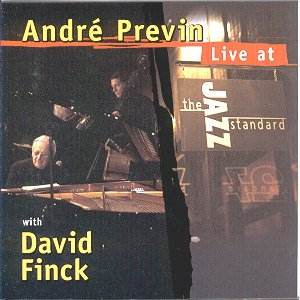
|
André Previn Live at the Jazz Standard
André Previn, piano, David Finck, bass
recorded October 2000 in New York
 Decca
013 220-2 [61:17] Decca
013 220-2 [61:17]
Crotchet
|
It's easy to forget, in the classical world
at least, that André Previn has had two other musical careers.
Readers of Film Music on the Web
may well know him better for his film career ranging from 1949's The
Sun Comes Up to Rollerball in 1975. His score for The
Four Horsemen of the Apocalypse (1960) is particularly celebrated,
yet in total Previn worked on 71 films either as composer, arranger,
orchestrator, song-writer, conductor or pianist. Meanwhile both classical
and cinematic worlds may be equally surprised by Previn's jazz career
- though this part of Previn's life does warrant 123 pages in Martin
Bookspan and Ross Yockey's André Previn: A Biography (Hamish
Hamilton, 1981). The truth is, jazz has always been important to Previn,
and though The Penguin Guide to Jazz by Richard Cook and Brian
Morton only goes so far as to allow that he was "more than just a dabbler",
in the 1950's he played with Billie Holiday, Benny Goodman, Dizzie Gillespie
and Ella Fitzgerald and wrote/arranged for Count Basie, Woody Herman
and again, Benny Goodman.
After a long break Previn returned to jazz in the late
1980's, recording "After Hours" (1989), "Uptown" (1990) and "Old Friends"
(1991) for Telarc. More recently he has teamed-up with bassist David
Finck, who himself played with Woody Herman, recording an all-Gershwin
album, "We Got Rhythm" and an all Ellington disc, "We Got It Good and
that Ain't Bad" as well as performing together live. This current album,
recorded at The Jazz Standard Club in New York in October 2000 is Previn's
first live jazz release since "Live at the Musikverein" with Mundell
Lowe and Ray Brown.
Dispensing with the drums which usually go with piano
and bass to make a jazz trio results in a fluid, alternately laid back
and effervescent set, Previn and Finck offering twelve tunes which won't
win any awards for breaking new ground in jazz, but which provide much
sophisticated melodic pleasure. The numbers range from standards "My
Funny Valentine" (Rogers & Hart), "I Got Rhythm" (Gershwin), "Lady
Be Good" (Gershwin) to slightly less well-known numbers "Come Sunday"
(Ellington), "Chelsea Bridge" (Strayhorn) to Previn's own "Hi Blondie"
and a fusion of "Quiet Music" written with celebrated lyricists Alan
& Marilyn Bergman with a Finck composition, "New Valley". But whether
it is the up tempo gyrations of Russ Freeman's "Batter Up" or the more
lyrical "My Funny Valentine" Previn makes the melodies his own with
surprisingly harmonic inventions and idiosyncratic rhythmic variations.
Its Previn's show - he even brought own Bosendorfer "Imperial" grand
to the club - but Finck gives more than sterling support. He is a subtle
and understated yet vital collaborator and partner in the music-making
process. Previn notes "Dave is the most virtuosic bass player I've ever
played with. Cross rythmns ands key changes don't bother him at all.
And he knows how to swing." Listen to Cole Porter's "What is
This Thing Called Love?" and you know its true.
If light, melodic but intelligent and impeccably crafted
jazz appeals, this album won't disappoint. The sound is excellent and
the only indication of the audience comes in the applause at the end
of each number. Yet their presence gives the programme that something
special which live rather than studio jazz exhibits and which makes
it such a special form. Not an album to convert anyone to jazz or to
set anyone's world aflame, but a fine and entertaining disc which should
give much pleasure to many listeners. Highly recommended.
Gary S. Dalkin
|
Error processing SSI file
|